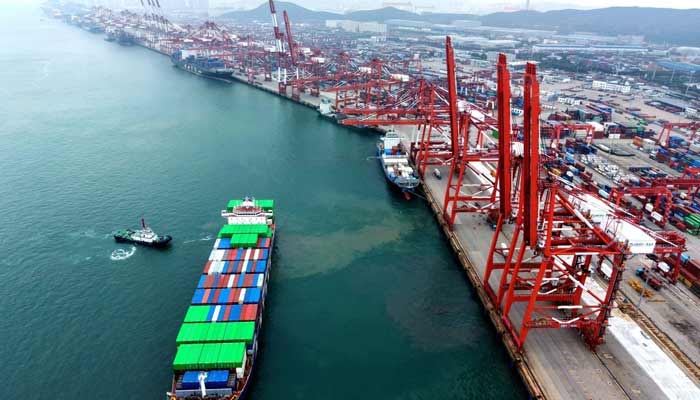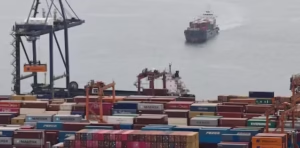An escalating trade conflict between the United States and China is set to reach a new level as Chinese ships will be required to pay special fees to dock at US ports starting Tuesday.
The US Trade Representative (USTR) announced the move in April, prompting China to impose similar charges on American ships from the same day.
These tit-for-tat port fees are the latest in a series of trade disputes between the world’s two largest economies, which have unsettled global financial markets and raised concerns about the stability of international trade.
Last week, President Donald Trump intensified the tensions by announcing an additional 100 percent tariff on Chinese goods and threatening to cancel a summit with Xi Jinping in response to China’s export restrictions on rare earth minerals.
The US government says the port fees aim to curb China’s dominance in global shipping and encourage investment in domestic shipbuilding.
The Alliance for American Manufacturing has urged that the revenue from these fees be used to create a Maritime Security Fund.
“The unfair economic practices of China are a major obstacle to revitalizing shipbuilding in the United States,” the alliance stated in support of legislation to strengthen the sector.
A Declining Industry
According to the USTR, the port fee will apply to each visit to US ports, capped at five visits per ship annually.
Chinese-made ships will pay $18 per net ton, or $120 per container, with a $5 annual increase for three years. Ships owned or operated by Chinese citizens but built elsewhere will be charged $50 per net ton, rising by $30 each year for the next three years.
The US shipbuilding industry currently represents just 0.1 percent of global ship production. The Trump administration views strengthening this sector as a national security priority due to China’s global leadership in ship manufacturing.
In 2024, President Joe Biden had instructed the USTR to investigate “China’s unfair practices in shipbuilding, shipping, and logistics.” Trump has continued this focus, announcing the creation of a White House Office of Shipbuilding in March to revive domestic production.
Blow for Blow
China responded on Friday, announcing that US-built ships or vessels linked to American companies must pay special duties to dock at Chinese ports. The fees start at 400 yuan ($56) per net ton, rising to 640 yuan ($90) in April 2026, with further annual increases.
“That’s a problem when you rely on a global supply chain you don’t control—it’s a national security risk,” said Matt Paxton, president of the Shipbuilders Council of America (SCA), representing over 150 US shipbuilding companies.
“We don’t want to be fully dependent on state-controlled Chinese enterprises,” Paxton added.
Since returning to the White House in January, Trump has focused on rebuilding US industrial capacity, often using tariffs to encourage domestic production. This strategy has led to large investments from foreign and American companies in factories and other facilities in the US.
Paxton highlighted growing interest in US-built ships from countries including South Korea, China, Japan, and Canada. Many US shipyards, currently underused with inactive dry docks, could benefit from this demand.
The industry is also encouraged by the Trump administration’s plan to build 250 commercial fleet ships and the $50 billion budget for the Coast Guard and Navy.
“It’s very encouraging. It’s a historical moment,” Paxton said.



















